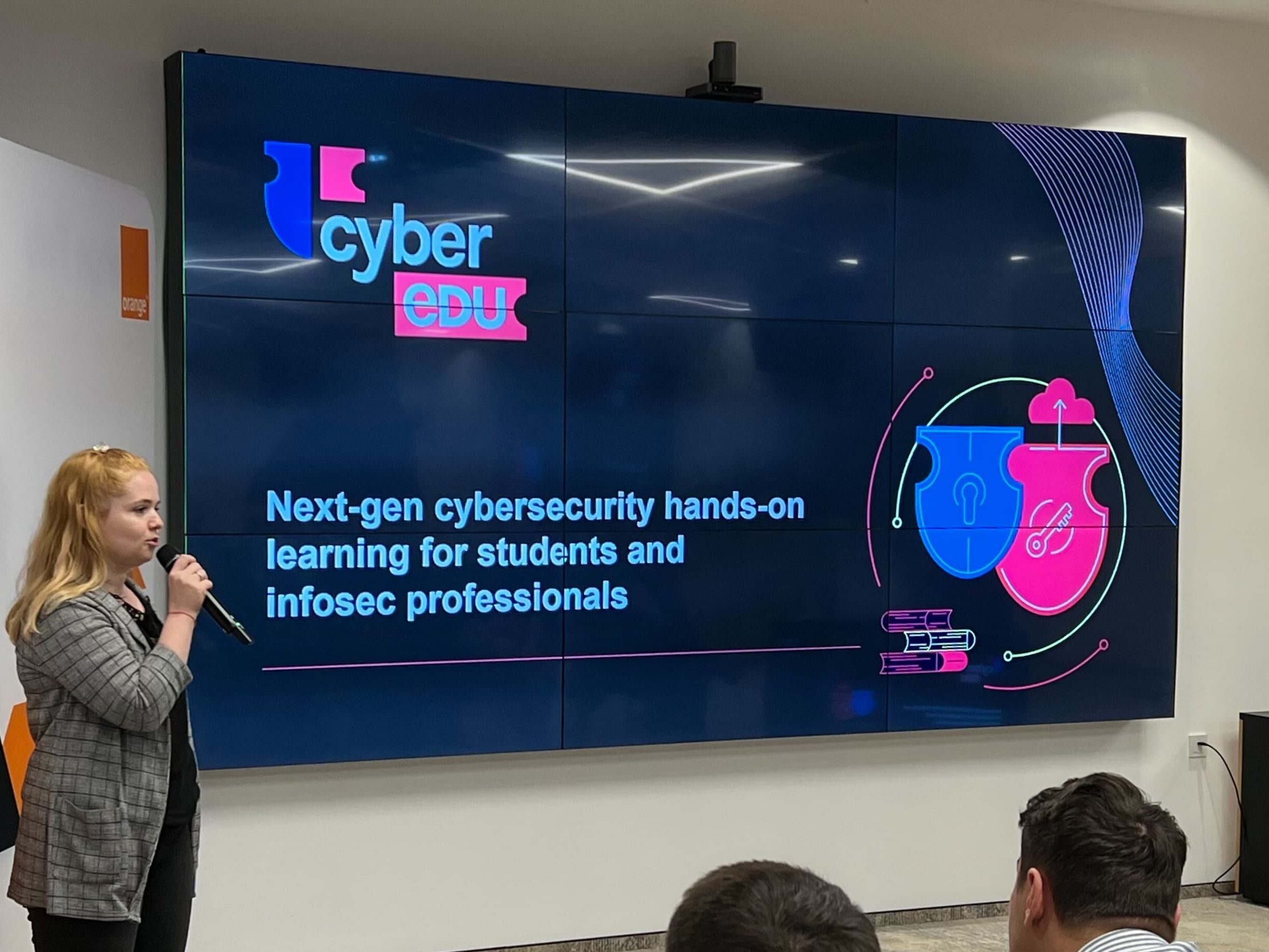
CyberEDU is a special environment that leverages cyber-range-as-a-service technology and a powerful learning tool for individuals or organizations that want to reach the next level of mastery in offensive or defensive cybersecurity.
What makes all of the above happen are the CyberEDU features and capabilities, which have seen significant growth since its official launch in 2020, particularly accelerating in 2023.
For 2024, we have plans for further improvement.
But that is a story for another time. Until then, let’s have a look at the evolution of the CyberEDU capabilities, features and content.
CyberEDU in numbers
Since the official launch in 2020, CyberEDU reached:
- almost 20,000 users;
- 1,300+ organizations;
- 70+ countries worldwide.
What is also definitory for our cyber-range-as-a-service platform is that:
- We hosted almost 150 activities, from small-scale exercises to international competitions, such as DefCamp Capture the Flag and other Hacking Village activities;

- CyberEDU offers 650+ cyber security exercises fully aligned with MITRE ATT&CK®, OWASP, CWE;
- You can access 100+ self-paced modules & career paths training designed for entry-level and specialists in the cyber security field, totaling 250+ hours of hands-on exercises;
- There are 1,400+ abilities ready to simulate any Adversarial & Legitimate User.
As you can see, we’re really into numbers and statistics, so we’ve put together 3 exciting metrics about user activity on CyberEDU in 2023:
- There have been 347,924 attempts to solve the challenges on the platform;
- There have been 45,713 solves;
- The machines were active from April 2023 for 11,683,784 minutes (this does not count standalone exercises that can be solved offline).
If it sounds like a lot has happened on CyberEDU, you are correct. You’ll see how, just below.
Features & Capabilities, Content & Improvements in 2023
CyberEDU is a groundbreaking platform that not only simplifies the complexities of cybersecurity education but also offers a unique and enriching experience for users at all levels of expertise.
This is all possible thanks to:
CyberEDU’s main features & capabilities
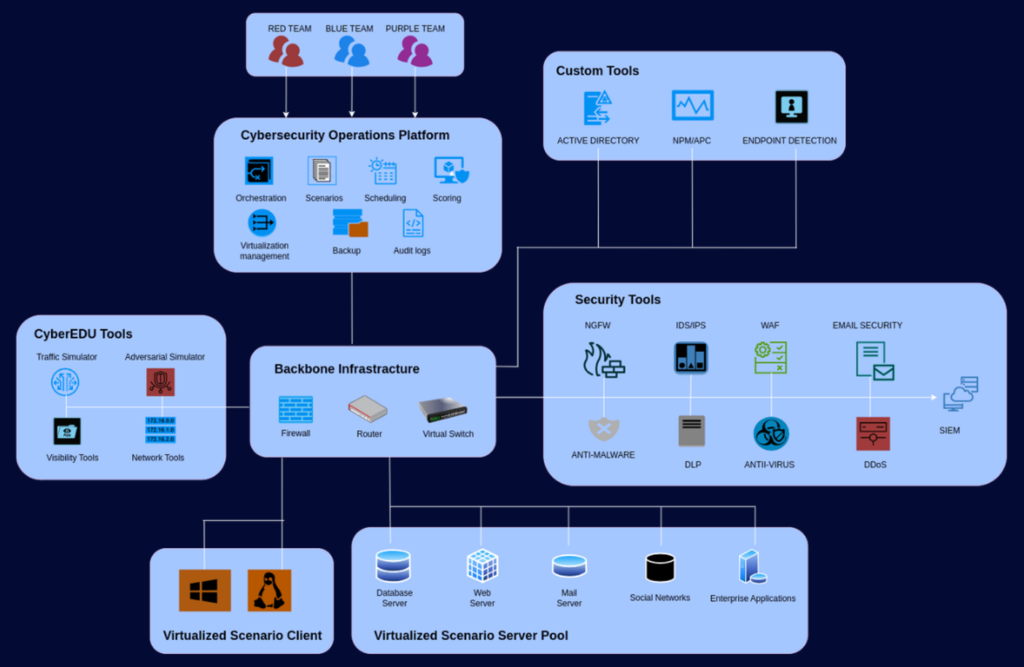
- Various exercise flavors, specially designed for activities that have from 10 to 5,000+ players:
- Attack & Defence: Teams receive access to a dedicated infrastructure with one or more services and Virtual Machines (VMs), and they have to find and fix vulnerabilities, automate and exploit other players and defend against incoming attacks from opponents;
- Red Team (s): Participants are rewarded for their offensive skills;
- Blue Team (s): Participants are rewarded for their incident response capabilities;
- Red vs. Blue Team: Each team has a different objective – to attack the opponent or to defend their perimeter;
- King of the Hill (Battle Royal): Participants need to obtain full system privileges and maintain as much as possible while other opponents are trying to defeat them;
- Jeopardy-style Capture the Flag: It is a cybersecurity competition format where participants solve challenges from various categories to earn points. Challenges are presented similarly to the “Jeopardy!” game show, with a board of questions that vary in point value based on difficulty;
- Exams: Universities & schools can host their interim and final exams.
- Comprehensive Management Interface: CyberEDU consolidates activities, training, infrastructure, adversarial and user simulations, and LMS management into a single interface, streamlining operations for both administrators and users;
- Flexible Scoring and Evaluation Engine: CyberEDU features a scoring and evaluation engine that accommodates various scoring methods. Content creators have the flexibility to design challenges, competitions or exams with unlimited scoring possibilities;
- Adversarial & Legitimate User Simulation capable of simulating user traffic, malicious activity, and actual attacks, enhancing the realism of cybersecurity training and testing;
- One Cockpit, Multi-Tenant Enabled: Administrators and users can seamlessly navigate through CyberEDU’s interface, ensuring a unified experience. Multi-tenancy support facilitates efficient management for various user groups;
- High Scalability with Virtual Machines: CyberEDU supports running scenarios and exercises of 1 to 1,000+ concurrent virtual machines, offering immense scalability for large-scale training and simulations;
- Enterprise-Ready with Single Sign-On (SSO) Integration: The CyberEDU platform is fully equipped for enterprise use, featuring Single Sign-On (SSO)/SAML capability. This integration streamlines user access by allowing employees to use their existing corporate credentials to log into the platform. It not only simplifies the login process but also enhances security and compliance with enterprise IT policies;
- Professional and Training Services, such as content development, event management, training programs and more;
- CYL (CyberEDU Language), a proprietary meta-language used to describe devices, network setup, and services for virtualisation engines (eg. VMware):
- Anyone can design and personalize large-scale infrastructures for Training, Red / Blue Team or Adversarial Simulation exercises in minutes;
- You write it once, and it can be deployed at any time for different-sized activities;
- VMs can be personalized or fine-tuned with Ansible roles, Bash or Powershell commands;
- Designed as a plugin-based microservice, easy to extend;
- Inspired by Kubernetes YAML and Docker Compose definition language for fast onboarding and a small learning curve;
- Drag-and-drop / WYSIWYG Infrastructure Designer planned for early 2024.
- Realistic IT&C Equipment Simulation: CyberEDU has the ability to simulate complex and various IT&C equipment types like firewalls, servers, endpoints, and SIEMs, and enhances the realism and applicability of training scenarios;
- Complex Network Simulations: CyberEDU supports the inclusion of multiple IP subnet segments, custom virtual machines, enabling the simulation of complex organizational networks for advanced training;
- We have also defined our offering to make CyberEDU friendly for:
- Governments, Military & Law Enforcement Agencies
- Academic & Training Providers
- Small & Medium Business & Enterprise
- Organizations with Critical Infrastructures
- and more!
Other CyberEDU features & capabilities
- Guided practical labs that teach skills, techniques and technologies used in daily activities of cybersecurity (see the example below);
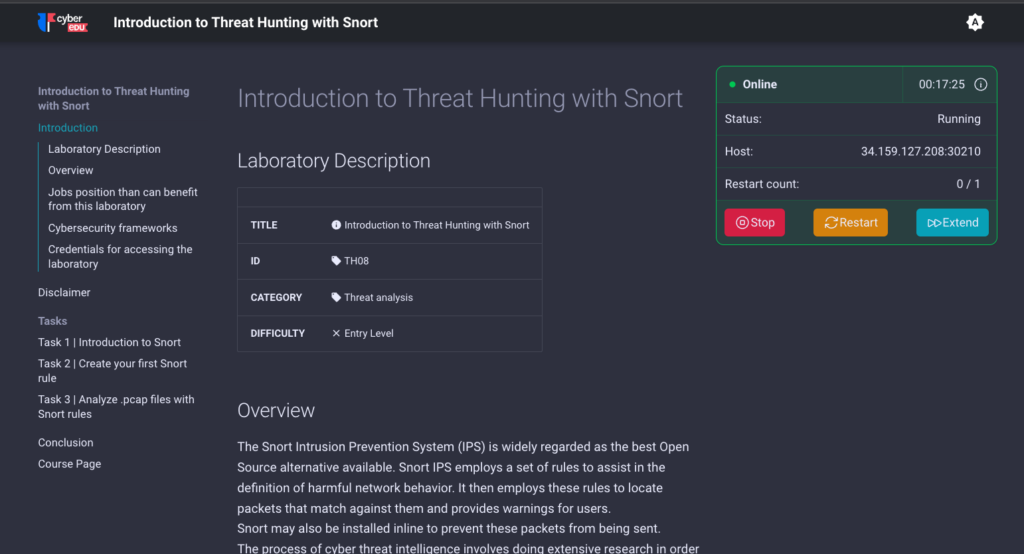
- Learning Management System in Markdown;
- Built-in Evaluation System allowing multiple types of evaluation such as: Open Questions, Single and Multiple choices, File Upload, Regular Expressions (Regex), Partial Scoring, Manual Review or Automated scoring and more;
- Automatic Certificate generation upon module completion;
- Isolated environment for each student;
- Track student’s activity and performance from Admin’s Dashboard;
- Education Archive functionality to enable a list of tasks and exercises without the solving guide;
- Players can host their own small-scale events & training activities with exercises available in the Education Archive, without any outside involvement;
- Real-Time Leaderboard & Participant statistics (see the example below);
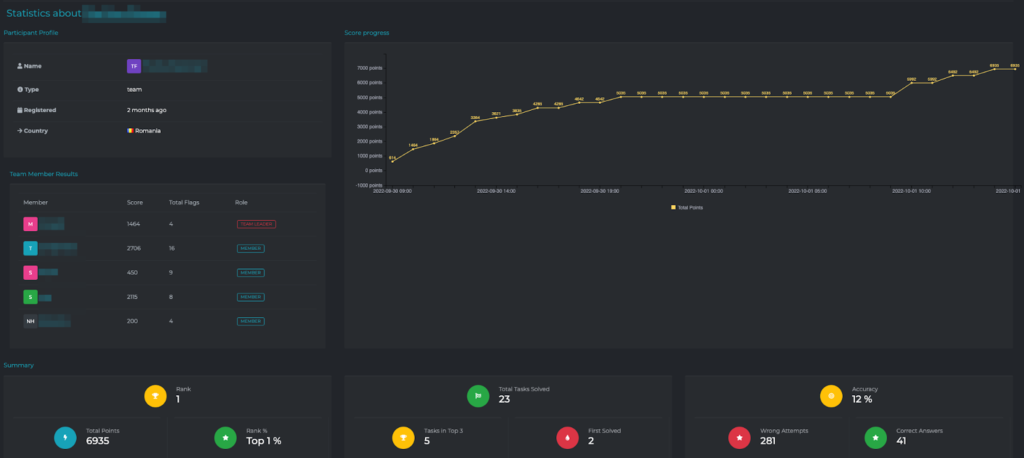

- Adaptable Difficulty Levels: CyberEDU has the ability to inject ad-hoc traffic and simulated activities to modify the scenario’s difficulty, tailoring the challenge to the user’s skill level;
- Individualized Player Environments: In multiplayer scenarios, traffic and attacks can be targeted to specific players, allowing personalized training without affecting others;
- User Activity Simulation: CyberEDU simulates user activities like opening applications and files, browsing or reading emails, providing a more complete and realistic cybersecurity environment;
- Advanced Traffic Replay: CyberEDU includes an innovative feature for replaying network traffic using a proprietary PCAP (Packet Capture) replay engine. This enables the tool to replicate past network activities and cyber incidents accurately, allowing users to analyze real-world traffic patterns and cybersecurity threats in a controlled environment. This functionality is crucial for detailed forensic analysis, vulnerability assessments, and enhancing the effectiveness of security protocols based on historical data;
- Versatile Questionnaire Design: CyberEDU supports various question types such as single answer, multiple answer, regular expressions, text response, and file upload, catering to diverse learning styles and assessment needs;
- Customized Scoring System: CyberEDU offers the ability to assign different marks to each answer option in multiple-choice questions, enabling a more nuanced evaluation of participant knowledge and decision-making skills;
- Interactive Feedback Mechanism: CyberEDU’s interface allows instructors to score player responses and provide immediate, tailored feedback, enhancing the learning experience and encouraging active participation;
- Real-Time Performance Tracking: Instructors can monitor participant progress in real-time, making it easier to identify knowledge gaps and adjust the exercise accordingly.
CyberEDU content
Now that we are done with the most technical aspects of CyberEDU, we can explain why such complex capabilities are needed.
You see…
- CyberEDU hosts 650+ cyber security exercises (labs, exercises, CTF challenges) developed by the our team from various categories, such as: Web Security, Cryptography, Application Security, Reverse Engineering and Exploitation, Digital Forensics and more, fully aligned with MITRE ATT&CK®, OWASP, CWE and other regulatory frameworks;
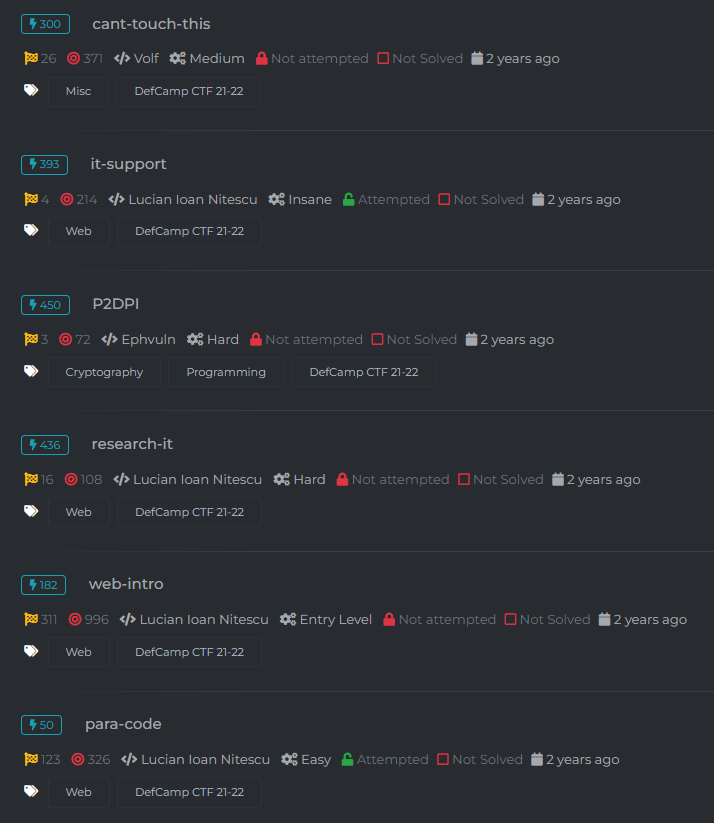
- Moreover, some of our customers already have access to a private library of learning content with up to 100 self-paced modules & career paths training designed for entry-level and specialists in the cyber security field, totaling over 250 hours of hands-on exercises. We’re currently working on giving public access to this CyberEDU content. When this happens, here’s a sneak peek of what you’ll learn:
> Introductory modules
- Linux Security
- Web Application Security
- Mobile Application Security
- Network Security
- Penetration Testing Fundamentals
> Threat Hunting module
- Threat Hunting Fundamentals
- Introduction to YARA
- Introduction to Suricata
- Introduction to Zeek
- Introduction to Snort
> Threat Intelligence module
- Threat Intelligence Fundamentals
- Introduction to Shodan
- Introduction to Canary Tokens
- Introduction to VirusTotal
> Malware Analysis module
- Malware Fundamentals
- Introduction to Ghidra and Malware Reverse Engineering
- Advanced Malware Analysis with CAPE
> Security Monitoring module
- Log Analysis & Security Monitoring fundamentals
- Using Elasticsearch to Determine How Systems Were Compromised
- Using Elasticsearch to Identify Malicious Actions
- Using Elasticsearch to identify security incidents
> Incident Response module
- Incident Response fundamentals
- Introduction to theHive
- Introduction to MISP
> Digital Forensics module
- Digital Forensics Fundamentals
- Introduction to Linux Sysmon
- Use Volatility to Confirm Ransomware Infection
> Advanced Web Apps Security module
- Advanced Web Exploitation with Metasploit
- Analyze the Web Application Code to Exploit Improper User Input Validation
- Analyze the logs data to obtain secrets from the web server
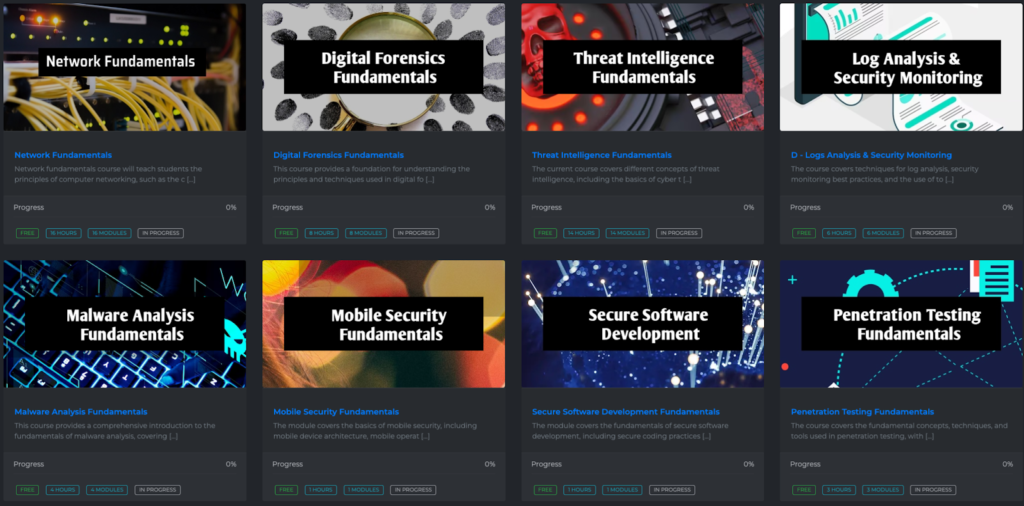
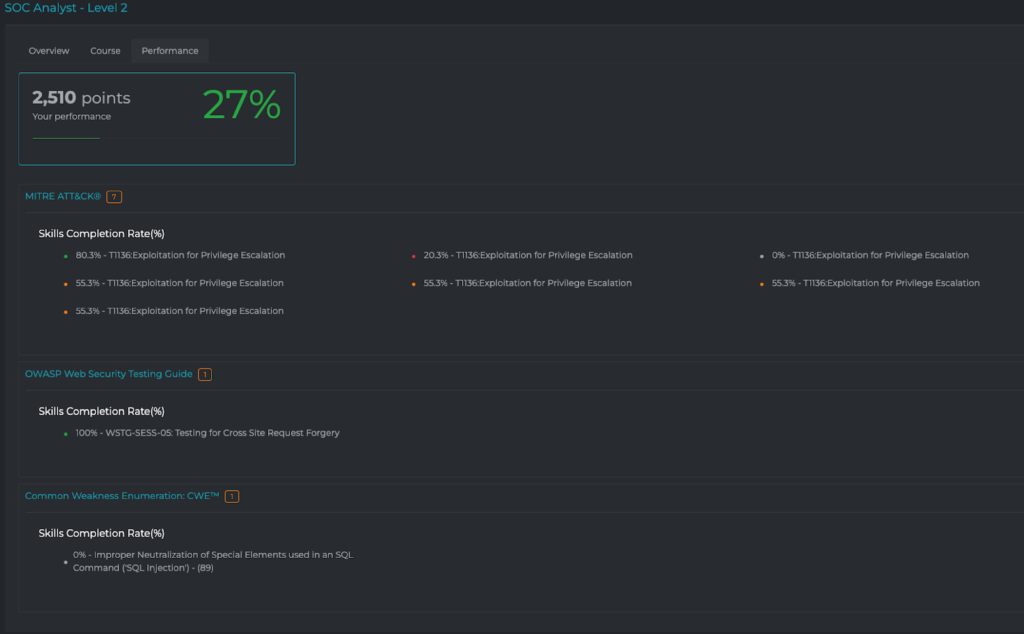
- The Adversarial & Legitimate User Simulation includes support for more than 1,400 abilities from Caldera and many others developed by the CyberEDU team to kick-start the process of adversarial and legitimate user simulations in any major IT/OT use-cases.
CyberEDU is also about community & events
This is precisely why, in 2023:
- We made sure our best students would be rewarded with a diploma upon course completion on CyberEDU; for example:
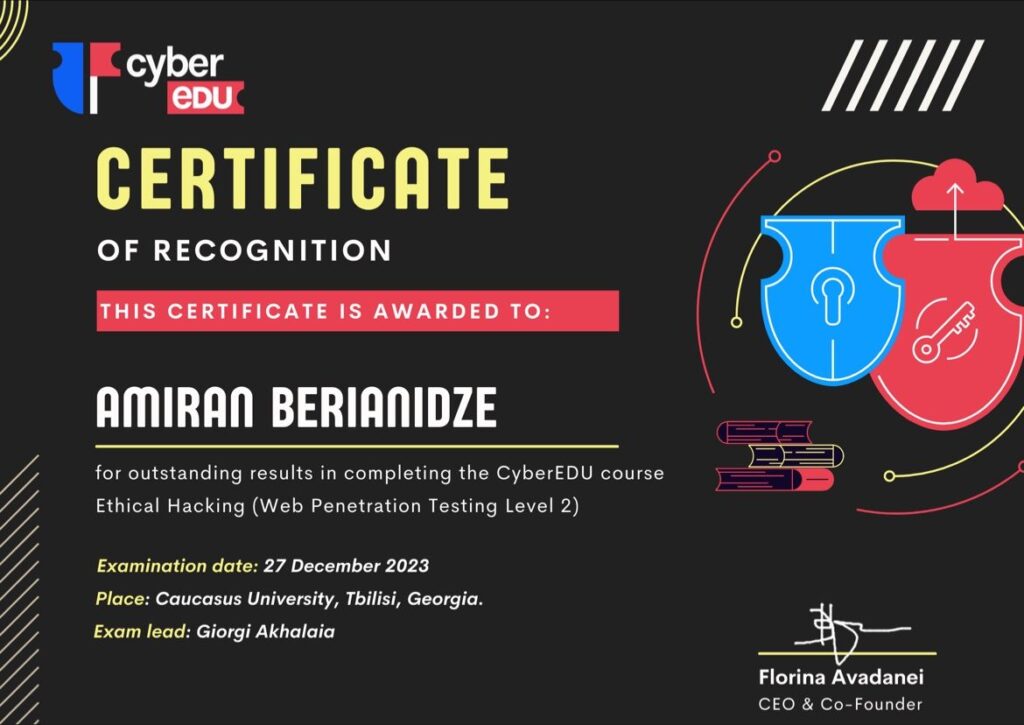
- We enjoyed a busy, but wonderful 14th of June day at VivaTech;

- We organized a summer meme contest for our Discord community. If you want to see what was the one meme to rule them all, hop on the CyberEDU server on Discord: create your CyberEDU account, log in, find the Discord invitation and join the conversation;
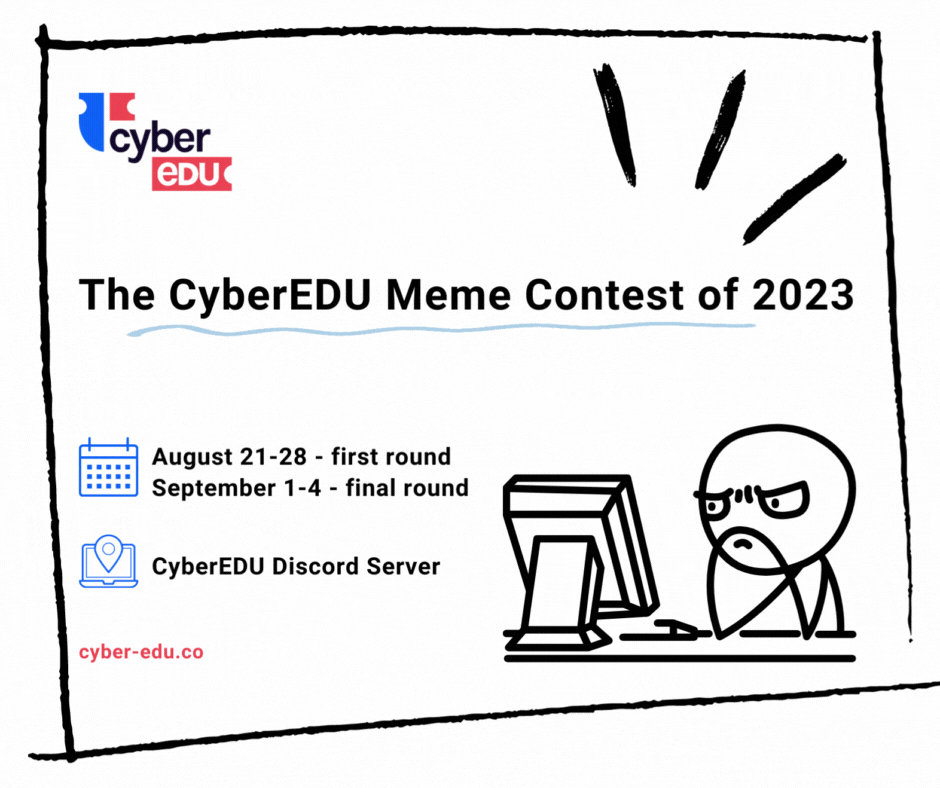
- We launched THIS BLOG, in September;
- We enjoyed good quality networking on October 27th-28th, at the Bucharest Cybersecurity Conference by DNSC;

- And, after that, on November 8-9 at GoTech World;
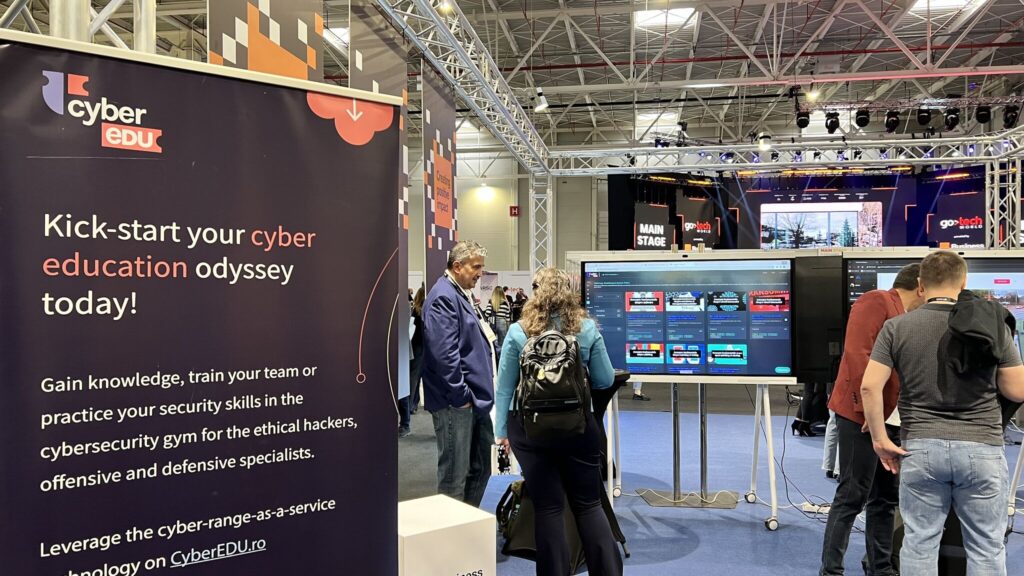
- And then we had a great time on November 17th at CyberWeekUVT;
- Of course, we celebrated some major international holidays (you guess which ones) by doing one of the things we know best – having fun!


But what we’re most proud of are the events we hosted or organized ourselves! Because these stand as testament to the complex capabilities we announced so far.
CyberEDU @ UNbreakable Romania
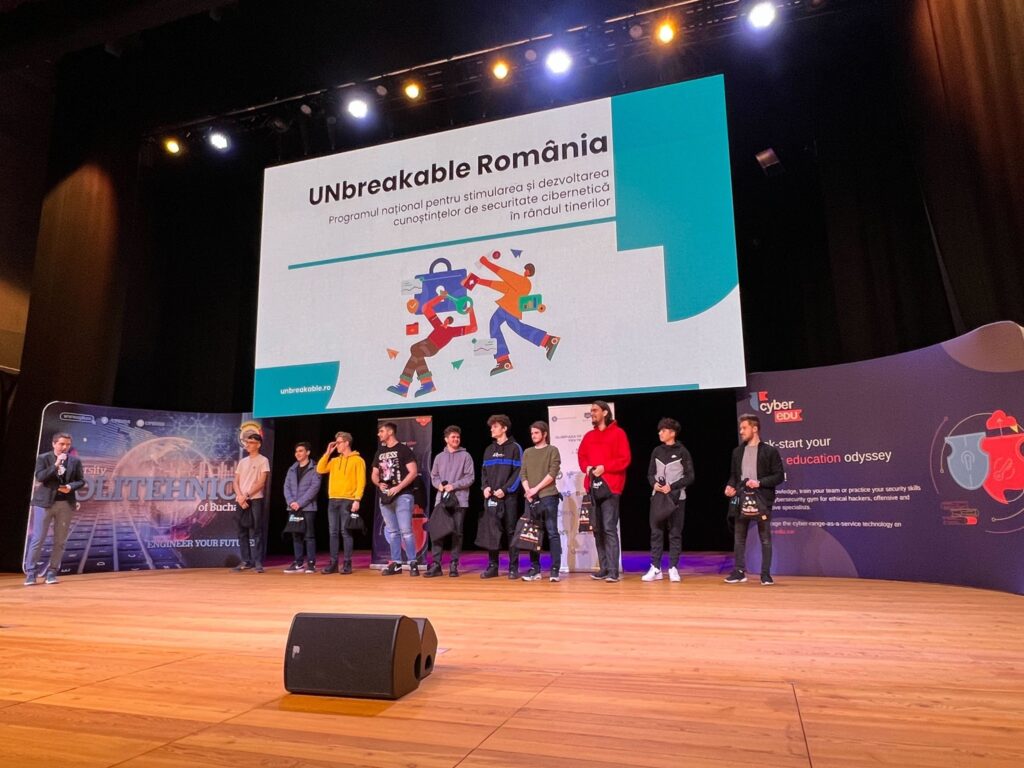
UNbreakable Romania is the most complex education program for high school and university students in the country. UNbreakable’s mission is to provide young cybersecurity enthusiasts with the most varied resources, both theoretical and practical, so useful for developing the skills needed to become good cybersecurity specialists. In addition to an intensive learning environment, the initiative also provides a competitive, testing virtual space that encourages collaboration and knowledge sharing.
Unbreakable Romania was oficialy launched in 2020 with a pilot edition. Since then, 7 editions took place, with over 4,000 young people from dozens of universities and hundreds of high schools in Romania participating durin all these years.
CyberEDU is happy to be the platform to officially host all UNbreakable Romania bootcamps and competition phases, including the 2024 edition.
CyberEDU @ The Romanian Cybersecurity Challenge – ROCSC
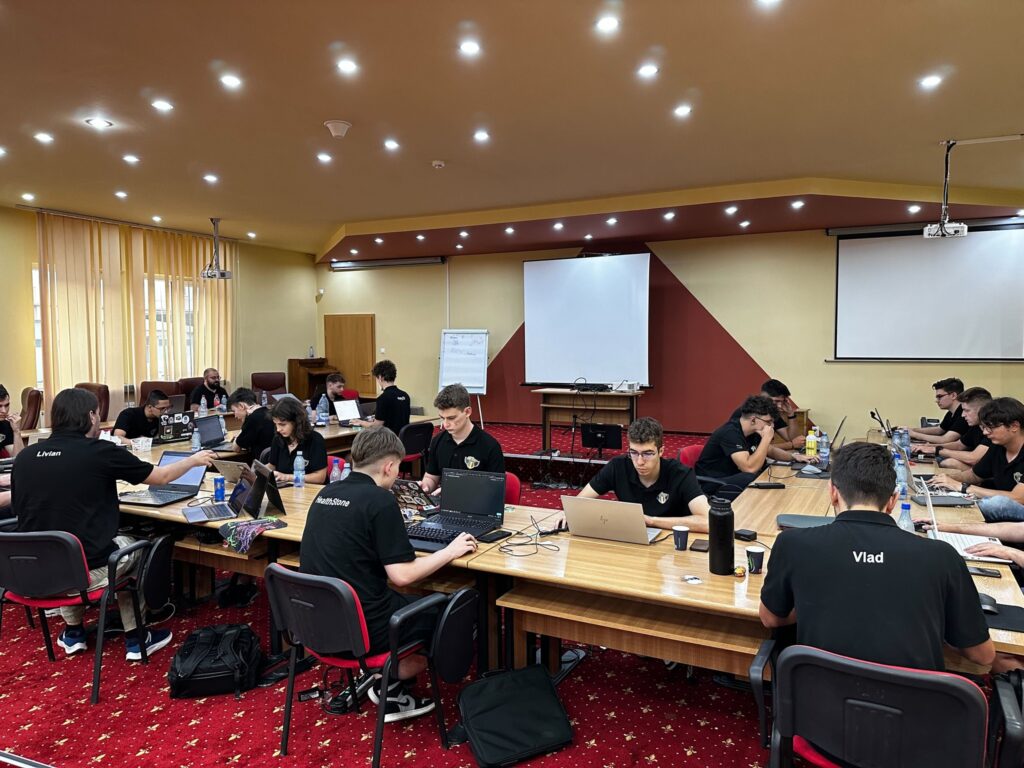
The Romanian Cybersecurity Challenge (ROCSC) is a national CTF competition where young participants compete in web security challenges, cryptographic puzzles, reverse engineering and investigations for prizes and a place on the national team that will represent Romania at the European Cybersecurity Challenge (ECSC).
Starting 2020, the CyberEDU team coordinated technical aspects of the national competition and contributed with Jeopardy and Attack & Defence exercises for the Qualifications, Finals and Bootcamp where we select the national team to represent Romania at ECSC.
In 2023, we took a step further and announced our support for ECSC 2023 as a Silver Partner.
CyberEDU @ DefCamp
There’s quite a history between CyberEDU, DefCamp and the Hacking Village, DefCamp’s playground for cybersecurity and hacking activities and competitions – you can read all about it here.
Coming closer to recent times, the Hacking Village at DefCamp 2023 hosted 9 out of 14 activities on CyberEDU.
Our team also contributed to:
- DefCamp Capture the Flag, at both the Quals and Final, the latter having a hybrid Jeopardy and Attack & Defence 1-day exercise, for the first time ever;
- DevOps Ninja: this was a code review exercise that delved into different aspects of DevOps, from basic automation tasks to intricate orchestrations, optimizations and programming languages;
- Reverse Engineering Kindergarten: we developed a series of reverse engineering challenges for beginners.
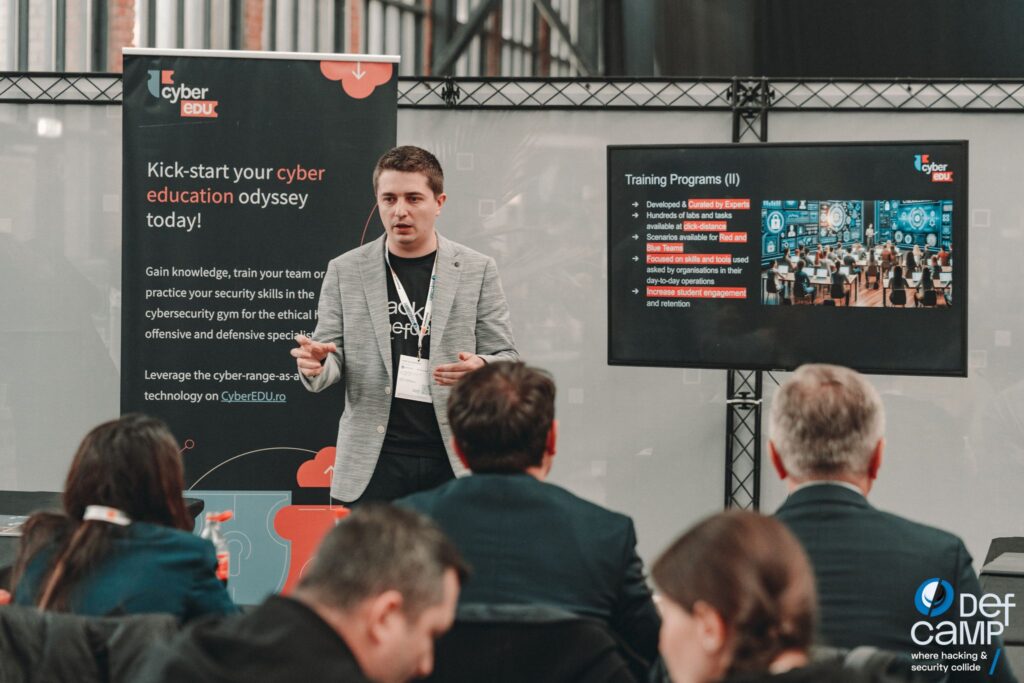

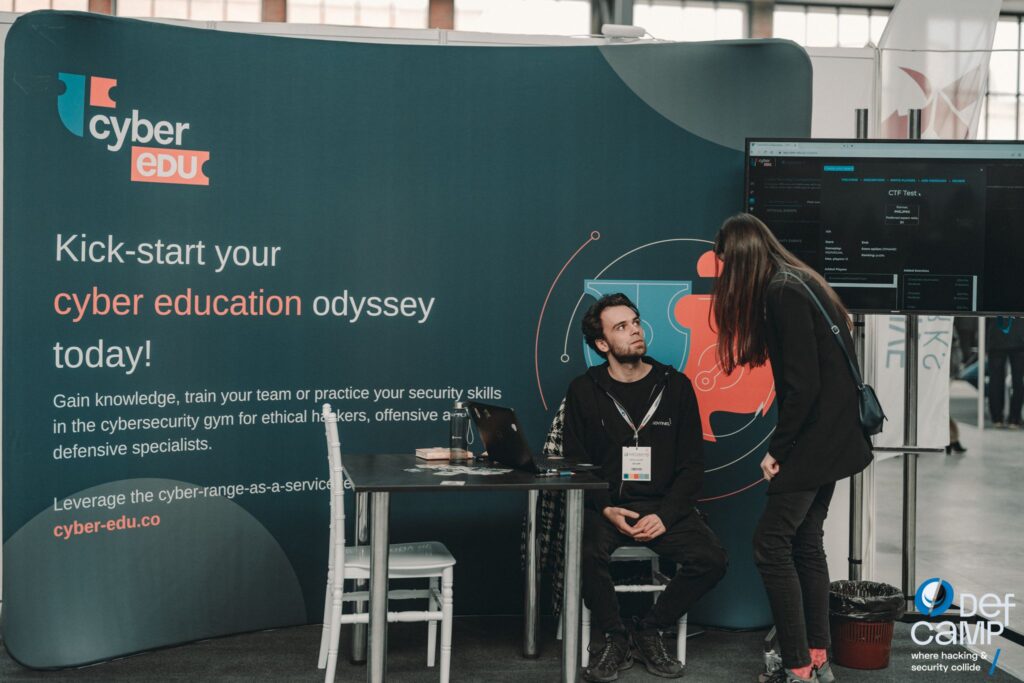
CyberEDU @ CyDEx
CyDEx is the largest national hands-on cybersecurity exercise from Romania.
In 2023, October 17-19, more than 400 players from 80 public institutions and private companies took part in this exercise.
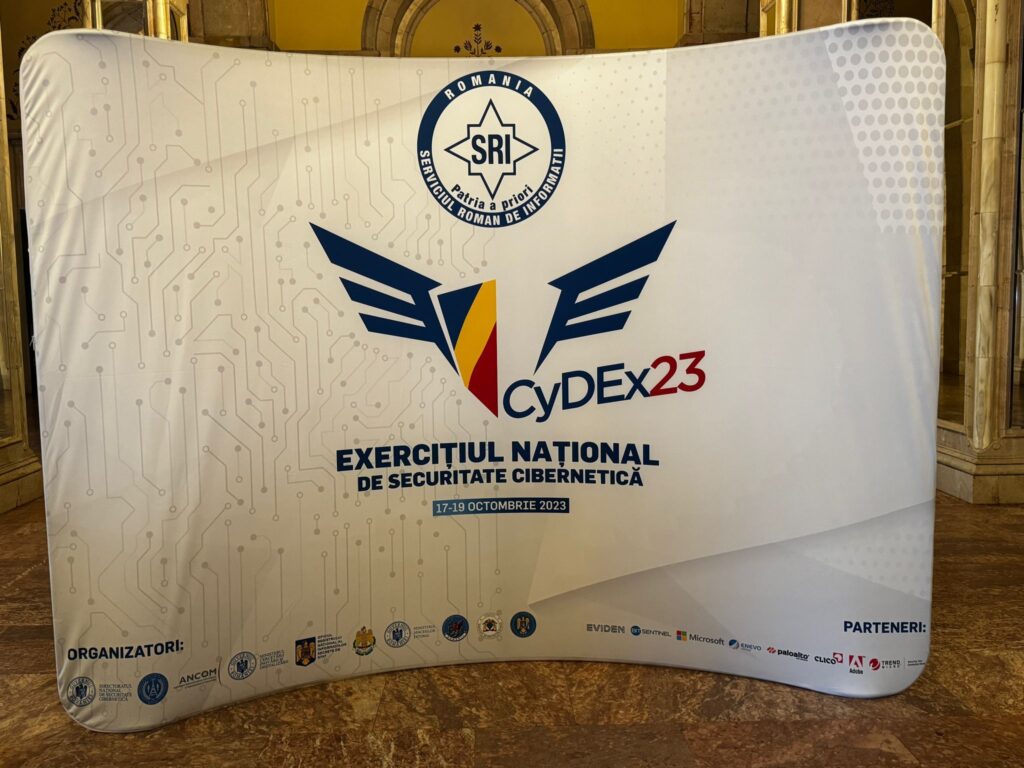

During CyDEx 2023, we contributed to 3 of the main competitive activities:
- The CyberEDU team co-organized, together with Bit Sentinel, the Attack & Defence exercise. Each participating institution formed a team that was tasked with defending an infrastructure developed by us, while simultaneously identifying and exploiting vulnerabilities in the systems of their competitors. This exercise fostered a hands-on experience in both offensive and defensive cybersecurity strategies, emphasizing teamwork, strategic thinking, and technical skills. The scenario was designed to escalate in complexity and impact over time, mimicking a sophisticated adversarial attack. Participants enjoyed a realistic experience of defending against evolving threats, honing their skills in network security, threat detection, and rapid response under pressure.
- As a side quest, our team developed the exercises for the Jeopardy Competitive Track. for web application and other categories.
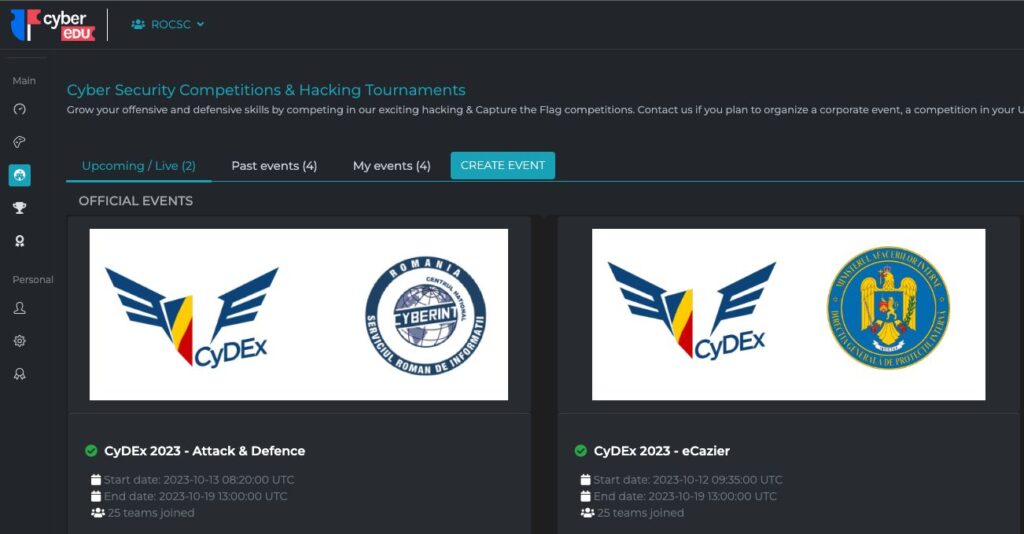
In retrospective, 2023 was quite a busy year – but equally rewarding.
2024 started strong as well, with CyberEDU hosting the first ever Romanian Cybersecurity Olympiad.
There’ll bee a lot more to share, so stay close to us!






